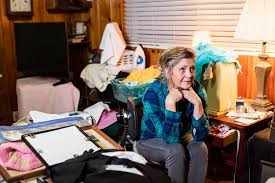HOARDING IS TREATABLE AND COVERED BY INSURANCE
Watch a video about Dr. Brodsky's treatment of hoarding. If you want to know if you or someone else has Hoarding Disorder email a question or arrange a free consultation. If you feel ready to start, make an appointment online or call 212-726-2390. In-person sessions are available in New York and New Jersey. Virtual teletherapy sessions are available nationwide in 42 states for hoarding and OCD from Charleston, South Carolina to Charlotte, North Carolina. If you're a family member of a hoarder who is resistant to therapy, then we can meet with you instead to help you deal with it, take back your life, and encourage the hoarder to consider therapy.
Watch more of Dr. Brodsky on TV about Hoarding.
Hoarding is a form of OCD that affects millions of people. The hoarder has excessive stress in discarding belongings. There are many reasons people hoard. They might attach sentimental importance to trivial objects and feel discarding them would be equivalent to making an entire era of their lives meaningless, or make an important person as if they never existed. They might think they'll suddenly need the item at some point "just in case" (e.g., expired financial or legal papers, receipts).

Hoarding is treatable and covered by insurance.
Others feel discarding basic supplies (expired food or shampoo) would be wasteful and reflect ingratitude. They might want to donate each item to someone special. And some hoard abandoned pets believing only they can care for them best, blind to the fact that the animals' health is actually deteriorating.
Hoarders are not "just sloppy," "disorganized," "lazy," or "stupid." In fact, the opposite is true. Most hoarders have above-average intelligence. They are perfectionists who have impossibly high standards of organization which overwhelm them so they can't get started putting things away. Their home might look like a mess to outsiders, but they know where everything is. Hence their unwillingness for anyone to move their belongings. Watch a video of Dr. Brodsky on hoarding. Or email a question to Dr. Brodsky.

A hoarding evaluation is the first step Dr. Brodsky does via a teletherapy "tour" of your home to help you declutter.
Without professional help, a crisis eventually develops. It can start with bed bugs, mice or rats. It can escalate to complaining neighbors, insurance inspectors who won't renew home insurance, and superintendents who are not allowed in for maintenance. Eventually, there can be a fire or flood from a plumming problem that doesn't get fixed. Finally, the resident or a guest can fall and get injured, a neighbor can report elder, child, or animal abuse to legal authorities, and police, an ambulance, or fire fighters forcibly enter the home, the situation is discovered, and the resident evicted.
You probably know a hoarder. It can be a neighbor, spouse, or an elderly parent. Are you a hoarder? Do you avoid inviting people to your home? Do you deny access to exterminators, plummers, electricians, landlords, superintendents, cable TV and delivery men? There's no need to suffer or feel embarrassed. There is highly effective treatment for hoarding, which is done in a sensitive non-threatening way. It is also covered by health insurance.
Watch a TV interview with Dr. Brodsky about this common yet very treatable condition. Email a question to Dr. Brodsky for a free consultation within 24 hours. If you feel ready to start, you can make an appointment online or call 212-726-2390. In-person sessions are available in New York and New Jersey. Virtual teletherapy is available nationwide in 42 states for hoarding and OCD from San Antonio, Texas to Baltimore, Maryland. If a hoarder is resistant to therapy, then we can meet with impacted loved ones instead to help them deal with it.
(Learn about Dr. Brodsky, the Treatment FAQ, other Types of OCD, and Locations)


